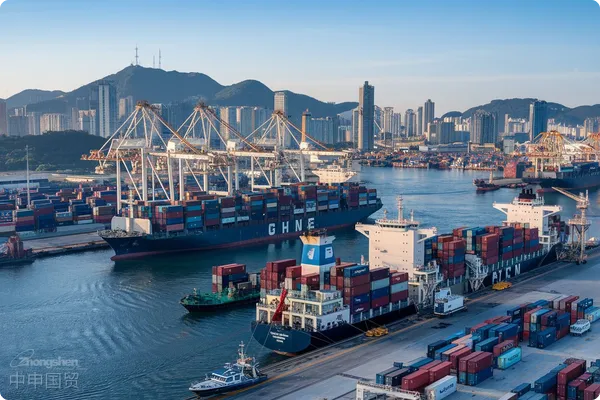- Shanghai Zhongshen International Trade Co., Ltd. - Two decades of trade agency expertise.
- Service Hotline: 139 1787 2118

With the development of global economic integration, the export of mechanical and electrical products plays a significant role in international trade. To encourage corporate exports, the government has introduced a series of preferential policies, among whichExport Drawbackis an important measure. However, for many enterprises, the process of applying for export tax rebates is cumbersome and complex, requiring professional knowledge and experience. Therefore, choosing a professional export tax rebate agency for mechanical and electrical products has become the choice of many companies.
I. Industry Conditions
According to data from the General Administration of Customs of China, in 2019, Chinas export value of mechanical and electrical products reached $1.5 trillion, a year-on-year increase of 4.4%. Among them, exports of machinery, electronic products, automobiles, and auto parts accounted for a relatively large proportion. With the continuous upgrading of Chinas manufacturing industry and technological innovation, the export prospects for mechanical and electrical products remain broad.
II. Concept of Export Tax Rebate Agency for Mechanical and Electrical Products
Export tax rebate agency for mechanical and electrical products refers to a service where enterprises entrust their export tax rebate business to professional agencies, which handle the export tax rebate procedures on their behalf. These agencies typically possess extensive experience and professional knowledge, enabling them to assist enterprises in quickly and accurately completing export tax rebate procedures, thereby improving efficiency and competitiveness.
III. Operational Process of Export Tax Rebate Agency for Mechanical and Electrical Products
1. Sign the Contract: The enterprise signs an entrustment contract with the agency, clarifying the rights and obligations of both parties. The contract should include the agencys service content, fee structure, confidentiality clauses, and other relevant details.
2. Prepare Materials: The enterprise prepares the necessary export tax rebate documents as required by the agency, includingExport Clearanceinvoices, VAT invoices, foreign exchange verification forms, etc.
3. Tax Rebate Application: The agency submits the export tax rebate application to the tax authorities based on the documents provided by the enterprise. During the application process, the agency must review the enterprises documents to ensure their authenticity and completeness.
4. Upon approval: The tax authorities review the export tax rebate documents submitted by the agency. Once approved, the rebate amount is transferred to the enterprises account.
5. : After the goods are exported, the agency enterprise should track the transportation and delivery of the goods and promptly solve the problems and feedback of the customers.: The agency provides follow-up services during the rebate process, keeping track of the rebate progress and offering relevant consultations and advice to the enterprise.
IV. Key Considerations for Export Tax Rebate Agency for Mechanical and Electrical Products
1. Choosing a reputable agency: When selecting an agency, enterprises should opt for formal and reputable ones to avoid potential losses caused by unprofessional agencies.
2. Understanding the agencys service content and fee structure: Before signing the contract, enterprises should fully understand the agencys service content and fee structure to prevent unnecessary disputes after the contract is signed.
3. Providing authentic and complete documents: When preparing export tax rebate documents, enterprises must ensure they provide authentic and complete information to avoid rebate failures due to incomplete or false documentation.
4. Staying updated on rebate policy changes: Export tax rebate policies are constantly evolving. Enterprises should stay informed about these changes to adjust their export tax rebate strategies accordingly.
5. Strengthening internal management: Enterprises should enhance internal management when handling export tax rebate procedures by establishing robust financial and internal control systems to ensure smooth operations.
V.foreign tradeKey clauses in the contract
1. Parties to the Contract: The contract should clearly specify the names, addresses, contact information, and other details of both parties.
2. Product DescriptionThe contract should specify in detail the product name, specifications, quantity, quality, and other information.
3. Pricing ClauseThe contract should clearly state the product price, payment terms, delivery location, and other information.
4. Delivery TermsThe contract should clearly define the delivery time, location, method, and other information.
5. Quality TermsThe contract should specify the product quality standards, inspection methods, acceptance criteria, and other information.
6. Liability for Breach of ContractThe contract should clearly define the liabilities for breach of contract, such as compensation for damages, penalties, etc.
7. Dispute Resolution ClauseThe contract should specify the methods for dispute resolution, such as negotiation, arbitration, litigation, etc.
8. Other TermsThe contract may also include other clauses, such as confidentiality clauses, insurance clauses, force majeure clauses, etc.
VI. Summary
Export tax rebate agency for mechanical and electrical products is a professional service that helps companies quickly and accurately complete export tax rebate procedures, improving efficiency and competitiveness. When selecting an agency, companies should choose a legitimate and reputable one and understand its service scope and fee structure. During the tax rebate process, companies must provide truthful and complete documentation, stay updated on policy changes, and strengthen internal management to ensure smooth operations. Additionally, when signing foreign trade contracts, companies should pay attention to key clauses such as parties involved, product description, pricing terms, delivery terms, quality terms, breach liabilities, and dispute resolution to avoid unnecessary disputes.
Related Recommendations
Category case
Contact Us
Email: service@sh-zhongshen.com
Related Recommendations
Contact via WeChat

? 2025. All Rights Reserved. Shanghai ICP No. 2023007705-2  PSB Record: Shanghai No.31011502009912
PSB Record: Shanghai No.31011502009912









